- Home
- Gerald Durrell
Beasts in My Belfry Page 10
Beasts in My Belfry Read online
Page 10
While I was on the bear section came the news that the duke was going to let several other zoos have pairs of this deer and was going to donate yet another pair to Whipsnade. We were going to have the task of collecting all the baby animals as soon as they were born at Woburn and hand-rearing them until they were of a suitable age to be transported to their new homes. The reason for this rather laborious method was the extreme nervousness of the deer. They would quite easily, if frightened – and they seemed more apt to be frightened by practically anything than any other animal I have met – display a stupidity that was unbelievable, such as charging a stone wall time and time again in an effort to break through. It was felt that if the baby deer were hand-reared by us they would at least be used to human beings, in which case perhaps unusual sights and sounds would not panic them to the same extent as if they had been caught as semi-adults.
When I discovered that I and another boy, called Bill, had been chosen to assist Phil Bates in the task of hand-rearing these deer I was overwhelmed. The babies were to be kept in two big stables and as they had to be fed during the night as well as very early in the morning Bill and I would take turns to sleep in the small shed up in the woods near the stables so that we could be on hand to help Phil both at night and during the day. The great day came and we went over to Woburn in the lorry.
The parkland at Woburn was one of the most beautiful I had ever seen. This, of course, was in the days before merry-go-rounds and enormous parties of sightseers had turned the place into a sort of three-ring circus. The massive and beautifully spaced trees, rolling green sward, and the gently moving herds of deer made a picture that was unforgettable, one that would have made Edward Landseer burst into tears of frustration. The babies, all wide-eyed and startled-looking, were each inside a sack with only their heads poking out. This was a precautionary measure so that they could not stand up or try to run and break a leg while travelling in the lorry. We loaded them on to a thick layer of straw and surrounded them with bales of straw as a cushioning. Then Bill and I took up our stations in the back amongst this forest of tiny heads and the lorry proceeded to Whipsnade at a gentle thirty miles an hour while we watched the babies closely to see what effect the journey was having on them. When the lorry first started to move, one or two of them kicked and bucked a bit inside their sacks but they soon settled down, and by the time we reached Whipsnade several of them had fallen asleep with the bored expression of professional railway travellers.
We carried them into the stables and cut away the sacking, then, in that incredibly wobbly and pathetic manner of young deer, they all staggered inebriatedly to their feet and weaved about the stable. It was only at this point that they seemed to realise that something was missing and so they started revolving in circles, bleating like goats – an astonishingly long, harsh ‘baaaa’. Hastily, Bill and I milked the herd of goats that had been carefully installed against the babies’ arrival, poured the still-warm, frothing milk into bottles, added the necessary vitamin drops and cod liver oil, and then, holding a bottle apiece, we entered the stable. Père David deer are just as stupid when babies as any other form of life and at that first feed I think Bill and Phil and I got more goat’s milk in our trouser turn-ups, in our pockets, and squirted into our eyes and ears than the babies consumed. They very soon got the hang of the idea that they should suck on the teat and thus obtain milk, but the coordination between their mouths and their brains left a lot to be desired and we had to be constantly on the alert, for they would mumble the teat around in their mouths until eventually the end was poking out of the side of their mouths, then, scrunching it between their teeth they would send a jet of goat’s milk straight into your eye. However, within two days they had mastered this and had decided that Phil, Bill and I constituted a joint mother-figure. There were eight of them and so we divided them up and put four in each stable, but as they grew bigger it became more and more difficult, for their exuberance at mealtimes was such that the moment they saw us they would deafen us with their harsh bleats and as soon as the stable door was open there would be a cascade of deer. On several occasions both Bill and I were knocked down by the fawns and we had to roll quickly out of their way, for they would stamp all over us with complete lack of discrimination and their very long hooves were exceedingly sharp.
I think it was at this time that I suddenly realised the full meaning of the term ‘rare’. Hitherto, when people talked of a rare animal, I had always been under the impression that this simply meant that it was rare in museum collections or in zoological gardens, but actual rarity in numbers had not really impinged on me. This, I think, was because people tended to say an animal was rare rather as though this were an accolade, as though it were something the animal should be proud of. But with the advent of the Père David deer and working so closely with them, it suddenly occurred to me that an astonishing number of animals were rare in quite a different sense. I started my researches on the subject and kept a massive file of the results. I did not know it at the time but I was producing a rather shaky and amateurish version of the Red Data Book now published by the International Union for the Conservation of Nature. The results of my researches horrified me: figures like ‘total population of Indian rhinos left – 250; Sumatran rhinos – 150; Bomean rhinos – 20; world population of Flightless Rail – 72 pairs; Arabian Oryx shot and machine-gunned to a possible total population of 30,’ and so on. The list, it seemed, was unending. It was then that I realised what the true function of a zoological garden should be; for, while trying to protect these animals in the wild state, it was obviously of urgent necessity that breeding groups should be set up in captivity as widely spread all over the world as possible. It was then that I conceived the idea that, should I ever acquire a zoo of my own, its main function would be this one work: to act as a reservoir and sanctuary for those harried creatures.
When it was my turn on duty with the deer I gave a lot of thought to these problems. At midnight, with the deer’s great, liquid eyes glittering in the light of the storm lantern as they butted and sucked greedily at the bottles of warm milk, it seemed to me that by any standards these animals had as much right to existence as I did. Getting up at five in the morning to give them their bottle feed was no penance. The oak woods in the first pale spears of sunlight would be as gold-green as a quetzal’s tail, leaves blurred with a gossamer coating of dew, and as one walked through the great trunks towards the stable where the deer were kept the birdsong was like an enormous chorus of thanksgiving in a green cathedral. Then one would open the stable door and be knocked down by one’s loving charges and they would nuzzle, bleating at one, slapping one with their long, wet, warm tongues. Though the precarious state of so many animal species all over the world still filled me with despondency, at least by helping to rear Père David deer I felt I was doing something concrete, however infinitesimal the gesture was.
By far the most entrancing animals on the section were our small herd of white-tailed gnus. All the gnus are pretty unbelievable antelopes to look at but the white-tailed has a particularly heraldic and mythical look about it. The head is blunt and the muzzle broad; the horns, curved like hunting horns, sweep down low over the eyes before curling upwards into sharp points so the animal is forced to peer under them in a myopic manner; a white beard juts out under the chin and another tuft of bristles decorates the top of the muzzle; the white mane is thick – a forest of uncombed tufts and sprigs; and a great sporran of hair grows between the forelegs. The long, sweeping, silky white tail is their best feature and they use it with all the elegance of an oriental dancer with a scarf. Combined with this extraordinary appearance (which makes them look as though they have been made up out of bits of several different animals) are the gnus’ extraordinary movements and the posturing they indulge in at the slightest provocation. To watch these idiotic creatures prancing, gyrating and snorting, their tails curling up over their backs, was one of the funniest sights I have seen.
Their movements were so
complex that it was difficult to fit them into a category. It could really only be described as something like an acute attack of St Vitus’s Dance. Some of it resembled folk-dancing of sorts but it seemed a little vigorous. The only folk dances I have ever witnessed were danced by elderly, aesthetic ladies with fringes and strings of beads and they were nothing like the gnus’ wild jitterbugging. Certainly there was a suggestion of ballet about it – of the more energetic and sweat-provoking sort – but the movements were too unorthodox for even the most frantically modern ballerina. This dance – or disease – is well worth watching. When the curtain rises, as it were, the gnus are facing you, bunched together, frowning through a forest of tufts and sprigs of hair. One member of the troop assumes the leadership and he (or she) starts the dance by giving a purring snort of astonishing loudness, a sort of preliminary ‘now girls, all together’. Then the whole lot minces a few steps on slender legs; they stand again, legs quivering, tails twitching almost in unison; then the leader gives another snort which invariably has the effect of making the whole troop lose their heads. Forgotten is the grouping and precision which delights the eye in ballet. With stamping, polished hooves, away they go, tails curled, bucking, kicking legs thrown out at ridiculous and completely unanatomical angles. The leader keeps up a barrage of frantic snorts – order which no one obeys. Then, quite suddenly, they all stop and stare at you from under their horns in horrified disapproval at your unmannerly laughter.
It was, in fact, the white-tailed gnus’ habit of dancing and its insatiable curiosity, that led it to the brink of extermination. In the early days, during the colonisation of South Africa, the white-tailed gnu was found in thousands and the early Dutch settlers killed it relentlessly, first because its meat, dried into biltong, could be used as food instead of slaughtering valuable cattle and sheep, and, secondly, the quicker it was out of the way, they thought, the more grazing room there would be for domestic stock. So in a very short time what had been the most numerous of the African antelopes became one of the rarest. Its engaging curiosity, which would make a herd stand there peering at the hunters while they were shot down, was partially the cause of their downfall and also the endearing fact that they loved to perform their dances and would prance and waltz round wagons bristling with guns, thus forming one of the easiest of targets. Now the white-tailed gnu is no longer a truly wild animal. Just over two thousand are left in small parks and on private farms and a scant hundred specimens in the zoos of the world.
As I watched our gnus posturing, rampant on a field of green grass, I thought how dull the African scene must be now without these gay, frenetic dancers of the veld. It seems that always progress destroys the happy and original, making everything banal, replacing these joyous prancing creatures with the dull, cud-chewing, utilitarian cow.
As well as the white-tailed gnu, we had a solitary brindled gnu, an animal much the same in shape though a bit thicker set and with a gingery fawn coat with chocolate brindles and a black mane and tail. If anything, this animal was even more mentally defective than the white-tailed gnu; his gyrations were even more wildly extravagant and his deep, belching roars of alarm rattled from deep in his chest like machine-gun fire. He was an incredibly nervous beast – more than liable, if you frightened him, to break a leg or do himself some other injury – so it was with feelings of acute apprehension that Harry and I received the news that Brinny had to be caught up and transported to London Zoo where they had acquired a mate for him.
‘That’s going to be a hell of a job, isn’t it, Harry?’ I asked.
‘’Fraid so, boy,’ said Harry, stirring our breakfast of mushrooms which was sizzling in the pan.
‘What are we going to put him in?’ I inquired. ‘We haven’t got anything big enough, surely?’
‘No,’ said Harry. ‘They’re sending a crate down on the lorry, Thursday. Then we crate ’im up and back ’e goes on the lorry.’
It sounded very simple the way Harry put it.
Thursday dawned and the lorry arrived with a tall, narrow crate into which we had to try and cajole an exceedingly nervous, high-spirited and agile gnu. We had let Brinny out into his paddock for a brief airing that morning; I had then enticed him back into the double stable by bribing him with oats, and now we had him safely locked up in one of the loose boxes. Next we had to manhandle the massive crate off the back of the lorry and get it into position facing the door of the empty loose box, then to raise the sliding door on the end of the crate. This took us some time and we were forced, not unnaturally, to make a fair bit of noise over it, which Brinny took grave exception to. He belched and snorted and reared and several times attempted to kick the side of the stable out. Once having got the crate in position, we went away for half an hour to discuss strategy and to let Brinny calm down a bit.
‘Now, boy,’ said Harry, ‘this is what we’ll do, see. I’ll be atop the crate and ’andle the slide, but once I’ve got that slide up I can’t see when ’e goes into the crate so you’ll ’ave to tell me when to drop the slide, see? Now, I want you to take the ladder into the stable next door, then you take this bit of two-be-two, lean over the dividing wall and when ’e gets near the crate just give ’im a tap on the nimp – only a tap, mind – that’s all ’e’ll need, just enough to make ’im run into the crate. Then, when ’e’s in, you give a yell and I’ll drop the slide, see?’
‘You make it sound so simple,’ I said bitterly.
‘Let’s ’ope it is,’ said Harry, grinning.
We trooped back to the stable, where Brinny was still gurking fiercely, and I manoeuvred the ladder into the stable next door, took my piece of wood and climbed up and peered over the partition. Brinny stared up at me, horror-stricken that I should do such a dastardly thing as to take him in the rear. His mane and beard looked wild and uncombed and gave him the air of having just arisen, dishevelled, from his bed. His eyes rolled, his nostrils grew wide with every snort and his curved black horn glinted like knives as he pranced and gyrated within the confines of the stable.
‘You ready, boy,’ shouted Harry from outside.
I eased my piece of wood over the partition and made sure of my foothold on the ladder.
‘Okay!’ I yelled. ‘Fire away.’
Brinny, who had been staring up at me with the expression of a spinster who had at last actually found a man under her bed, naturally waltzed round to face the door and watch as the slide on the crate was slowly raised. He snorted like a volcano and minced from side to side nervously As he was not watching me I manoeuvred my piece of wood into position. I grasped it firmly with one hand and cupped my other hand over the end. I could not have chosen a more unfortunate grasp.
‘I’m going to chivvy him, Harry,’ I called.
‘All right, boy,’ said Hany.
I carefully lowered my piece of wood towards Brinny’s rotund and quivering backside. As the end of my stick touched his glossy hide it was as though I had touched a match to a short fuse on a barrel of T.N.T. Everything seemed to happen at once. Feeling the stick, Brinny wasted no time, he leapt straight into the air and tried to kick his heels over his horns. He caught my piece of wood and shot it skywards like a rocket so that it crashed against the roof of the stable. My hand, which was cupped round the end of it, was therefore crushed against the ceiling as though caught by a pile-driver. The pain was so excruciating that I dropped the wood and tried to struggle back over the partition which I was half lying on. I could feel the ladder swaying under me. At that moment Brinny uttered a particularly prodigious snort, put his head down and rushed into the crate.
‘Slide, Harry, slide!’ I yelled desperately just as the ladder gave under me and I fell into the stable. The slide crashed into position and we had Brinny imprisoned – but only just, for he had galloped into the crate and hit the end of it with his horns, making the whole structure sway like a ship in a hurricane. Then he attacked the end of the crate with short jabs of his horns and splintered wood began to fly in all directions. People started
running about in pursuit of hammer and nails to repair the damage before Brinny could force his way out. Harry, perched precariously on the swaying crate, peered down at me.
‘You all right, boy?’ he inquired anxiously.
I got up a trifle shakily; my hand felt as though it had been trodden on by an elephant and was already beginning to swell. ‘I’m okay, but I think I’ve bust my hand,’ I said.
This proved to be correct, for when I had been taken down to the hospital and X-rayed, they found that I had cracked three of the bones in the palm of my hand. I was lucky, really, not to have had them splintered and crushed through the flesh for my hand had been sandwiched between wood and wood with considerable force. I was given pain-killers which did everything but kill pain – and told to stay off work for forty-eight hours to allow the bones to settle, as the doctor put it.
This was my first honourable wound in the course of duty, as it were, and so I was gratified that Mrs Bailey treated me with the concern and respect for one who, if he had not actually won the V.C., had come very close to it.
That evening I was sitting by the fire nursing my aching hand when Charlie came home.
‘Well, boy, you’d better get packed up,’ he greeted me.
‘Packed up? Whatever are you talking about, Charlie?’ asked Mrs Bailey.
‘Heard just now from the office,’ said Charlie, wiggling his slippered feet appreciatively in front of the fire. ‘We’re to go home at the end of the week.’

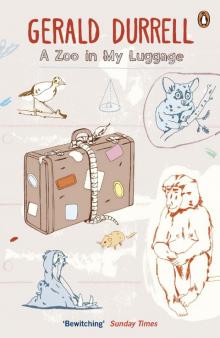 A Zoo in My Luggage
A Zoo in My Luggage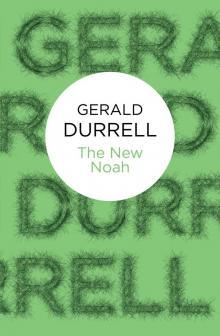 The New Noah
The New Noah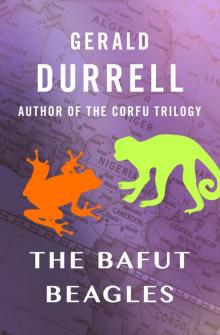 The Bafut Beagles
The Bafut Beagles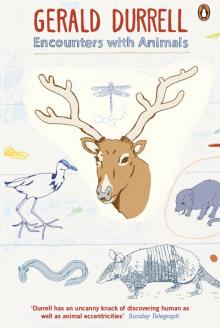 Encounters With Animals
Encounters With Animals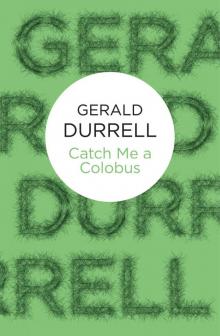 Catch Me a Colobus
Catch Me a Colobus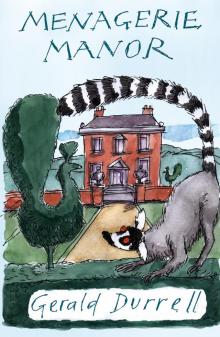 Menagerie Manor
Menagerie Manor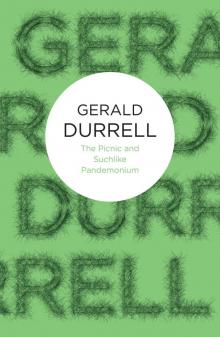 The Picnic and Suchlike Pandemonium
The Picnic and Suchlike Pandemonium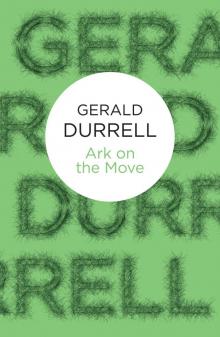 Ark on the Move
Ark on the Move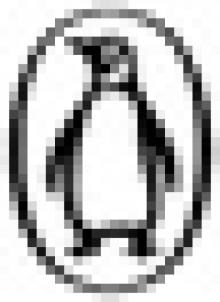 My Family and Other Animals
My Family and Other Animals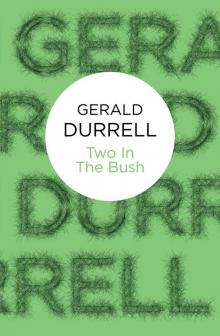 Two in the Bush (Bello)
Two in the Bush (Bello)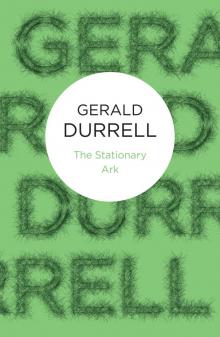 The Stationary Ark
The Stationary Ark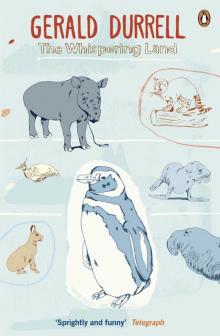 The Whispering Land
The Whispering Land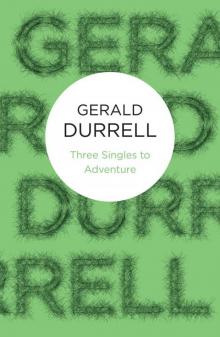 Three Singles to Adventure
Three Singles to Adventure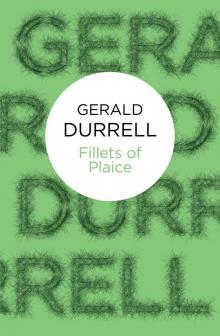 Fillets of Plaice
Fillets of Plaice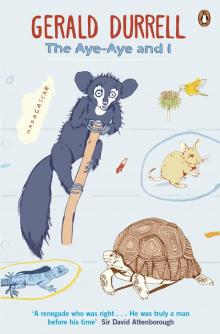 The Aye-Aye and I
The Aye-Aye and I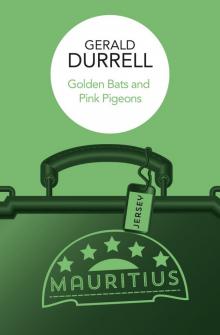 Golden Bats & Pink Pigeons
Golden Bats & Pink Pigeons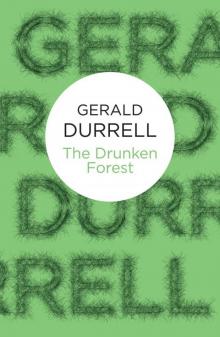 The Drunken Forest
The Drunken Forest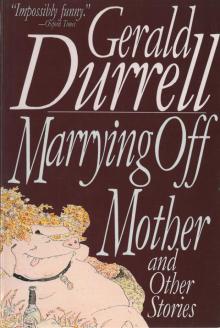 Marrying Off Mother: And Other Stories
Marrying Off Mother: And Other Stories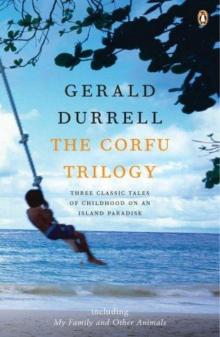 The Corfu Trilogy (the corfu trilogy)
The Corfu Trilogy (the corfu trilogy)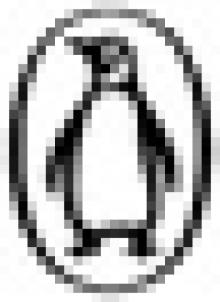 The Corfu Trilogy
The Corfu Trilogy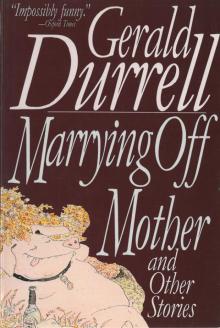 Marrying Off Mother
Marrying Off Mother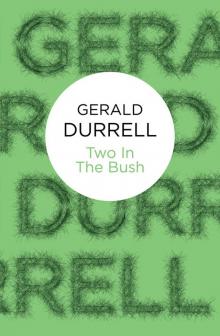 Two in the Bush
Two in the Bush